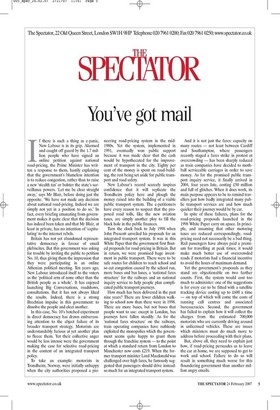You've got mail
1 f there is such a thing as e-panic, New Labour is in its grip. Alarmed and caught off guard by the 1.7 million people who have signed an online petition against national road-pricing, the Prime Minister has written a response to them, hastily explaining that the government's blameless intention is to reduce congestion, rather than to raise a new 'stealth tax' or bolster the state's surveillance powers. 'Let me be clear straight away,' says Mr Blair, before doing just the opposite. 'We have not made any decision about national road-pricing. Indeed we are simply not yet in a position to do so.' In fact, every briefing emanating from government makes it quite clear that the decision has indeed been taken and that Mr Blair, at least in private, has no intention of 'capitulating' to the internet rebels.
Britain has not yet abandoned representative democracy in favour of email plebiscites. But this government was asking for trouble by inviting the public to petition No. 10, thus giving them the impression that they were participating in an online Athenian political meeting. Ten years ago, New Labour introduced itself to the voters as the 'political arm of none other than the British people as a whole'. It has enjoyed launching Big Conversations, roadshows, consultations. But it has not always liked the results. Indeed, there is a strong Brechtian impulse in this government: to dissolve the people and elect another.
In this case, No. 10's botched experiment in direct democracy has drawn embarrassing attention to the abject failure of its broader transport strategy. Motorists are understandably furious at yet another plan to fleece them. Yet their collective anger would be less intense were the government making the case for selective road-pricing in the context of an integrated transport policy.
To take an example: motorists in Trondheim, Norway, were initially unhappy when the city authorities proposed a pioneering road-pricing system in the mid1980s. Yet the system, implemented in 1991, eventually won public support because it was made clear that the cash would be hypothecated for the improvement of transport in the city. Eighty per cent of the money is spent on road-building, the rest being set aside for public transport and road safety.
New Labour's record scarcely inspires confidence that it will replicate the Trondheim policy here and plough the money raised into the building of a viable public transport system. The e-petitioners have every reason to suspect that the proposed road tolls, like the new aviation taxes, are simply another ploy to fill the black hole in the public finances.
Turn the clock back to July 1998 when John Prescott unveiled his proposals for an integrated transport system. It was in this White Paper that the government first floated proposals for road-pricing in Britain. But in return, we were promised huge investment in public transport. There were to be safe routes for children to reach school and so cut congestion caused by the school run, more buses and bus lanes, a 'national fares structure' for the railways and an national inquiry service to help people plan complicated public transport journeys.
How much has been delivered in the past nine years? There are fewer children walking to school now than there were in 1998. There are more buses, but not buses that people want to use: except in London, bus journeys have fallen steadily. As for the 'national fares structure' on the railways, train operating companies have ruthlessly exploited the monopolies which the government seems quite happy to grant them through the franchise system — to the point at which a standard return from London to Manchester now costs £219. When the former transport minister Lord Macdonald was challenged over high fares, he famously suggested that passengers should drive instead: so much for an integrated transport system.
And it is not just the fares: capacity on many routes — not least between Cardiff and Southampton, where passengers recently staged a fares strike in protest at overcrowding — has been sharply reduced as train companies have decided to mothball serviceable carriages in order to save money. As for the promised public transport inquiry service, it finally arrived in 2004, four years late, costing £50 million and full of glitches. When it does work, its main purpose appears to be to remind travellers just how badly integrated many public transport services are and how much quicker their journey would be by car.
In spite of these failures, plans for the road-pricing proposals launched in the 1998 White Paper carry on apace. In principle, and assuming that other motoring taxes are reduced correspondingly, roadpricing need not necessarily be a bad thing. Rail passengers have always paid a premium for travelling at peak times; it would make much better use of overcrowded roads if motorists had a financial incentive to avoid the hours of maximum demand.
Yet the government's proposals as they stand are objectionable on two further counts. First, the system would cost too much to administer: one of the suggestions is for every car to be fitted with a satellite tracking device costing up to £600 a time — on top of which will come the costs of running call centres and associated bureaucracies. Second, the government has failed to explain how it will collect the charges from the estimated 700,000 motorists who are currently driving around in unlicensed vehicles. These are issues which ministers must do much more to address before proceeding with their plans.
But, above all, they need to explain just how, if road-pricing persuades us to leave the car at home, we are supposed to get to work and school. Failure to do so will result in something much worse for this floundering government than another million angry emails.






















































 Previous page
Previous page